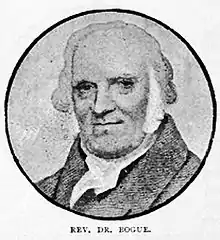David Bogue
Rev Dr David Bogue DD (18 February 1750 – 25 October 1825) was a British nonconformist leader.
David Bogue | |
|---|---|
 Nonconformist preacher | |
| Born | 1750 |
| Died | 1825 |
Life
He was born at Hallydown Farm, in the parish of Coldingham, Berwickshire, Scotland, the son of John Bogue, farmer, and his wife, Margaret Swanston. He received his early education in Eyemouth.[1]
After studying Divinity at Edinburgh University, he was licensed to preach by the Church of Scotland, but, failing to find a patron, made his way to London in 1771, to teach in schools at Edmonton, Hampstead and then Mansion House Cottage in Camberwell. In 1777, he settled as minister of the independent Congregational church at Gosport in Hampshire.[2] His predecessors at the Independent Chapel of Gosport were the Rev. James Watson (1770–76) and the Rev. Thomas Williams (1750–70).[3]
In 1771 he established an institution for preparing men for the ministry.[4][5] It was the age of the new-born missionary enterprise, and Bogue's academy was largely the seed from which the London Missionary Society grew.[6] In 1800 the society placed missionaries with Bogue for preparation for their ministries.[7] Bogue himself would have gone to India in 1796 if not for the opposition of the East India Company.[6] In 1824 he taught Samuel Dyer at Gosport before he left for Penang as a missionary with the London Missionary Society.[4]
He was also involved in founding the British and Foreign Bible Society and the Religious Tract Society, and in conjunction with James Bennett, minister at Romsey, wrote a well-known History of Dissenters (3 vols., 1809). Another of his writings was an Essay on the Divine Authority of the New Testament.[6]
In 1815 Yale University awarded him a doctor of divinity (DD).
He died on 25 October 1825 in Brighton during the London Missionary Society's annual tour.[4]
Publications
- Seeking a Repeal of the Test Acts (1790)
- An Essay on the Divine Authority of the New Testament (1801)
- Catechism for the Use of All Churches in the French Empire (1807)
- A History of the Dissenters, from the Revolution of 1688 to 1808 4 vols. (1808–12)
Notes
- Fast ecclesia esc, Archive.
- "David Bogue (1750–1825)". Dr Williams’s Centre for Dissenting Studies. 2011. Retrieved 21 December 2013.
- Harvey-Williams, Nevil (March 2011). "The Williams Family in the 18th and 19th Centuries - Part 1". Retrieved 21 December 2013.
- Grosart 1886.
- "Gosport, Hampshire, 1777–1826". Dr Williams’s Centre for Dissenting Studies. 2011. Retrieved 22 December 2013.
-
 One or more of the preceding sentences incorporates text from a publication now in the public domain: Chisholm, Hugh, ed. (1911). "Bogue, David". Encyclopædia Britannica. 4 (11th ed.). Cambridge University Press. p. 121.
One or more of the preceding sentences incorporates text from a publication now in the public domain: Chisholm, Hugh, ed. (1911). "Bogue, David". Encyclopædia Britannica. 4 (11th ed.). Cambridge University Press. p. 121. - Parker, Irene (1914). Dissenting academies in England: their rise and progress, and their place among the educational systems of the country. Cambridge University Press. p. 140. ISBN 978-0-521-74864-3.
- Attribution
![]() This article incorporates text from a publication now in the public domain: Grosart, Alexander Balloch (1886). "Bogue, David". In Stephen, Leslie (ed.). Dictionary of National Biography. 5. London: Smith, Elder & Co.
This article incorporates text from a publication now in the public domain: Grosart, Alexander Balloch (1886). "Bogue, David". In Stephen, Leslie (ed.). Dictionary of National Biography. 5. London: Smith, Elder & Co.
References
- Davies, Evan (1846). The Memoir of Samuel Dyer: Sixteen Years Missionary to the Chinese. London: John Snow.
- "Michael Laird, 'Bogue, David (1750–1825)', Oxford Dictionary of National Biography, Oxford University Press, Sept 2004; online edn, May 2006". Retrieved 23 June 2008.
Further reading
- Chambers, Robert; Thomson, Thomas Napier (1857). . A Biographical Dictionary of Eminent Scotsmen. 1. Glasgow: Blackie and Son. pp. 268–70 – via Wikisource.
- Chisholm, Hugh, ed. (1911). . Encyclopædia Britannica (11th ed.). Cambridge University Press.
- . Dictionary of National Biography. London: Smith, Elder & Co. 1885–1900.